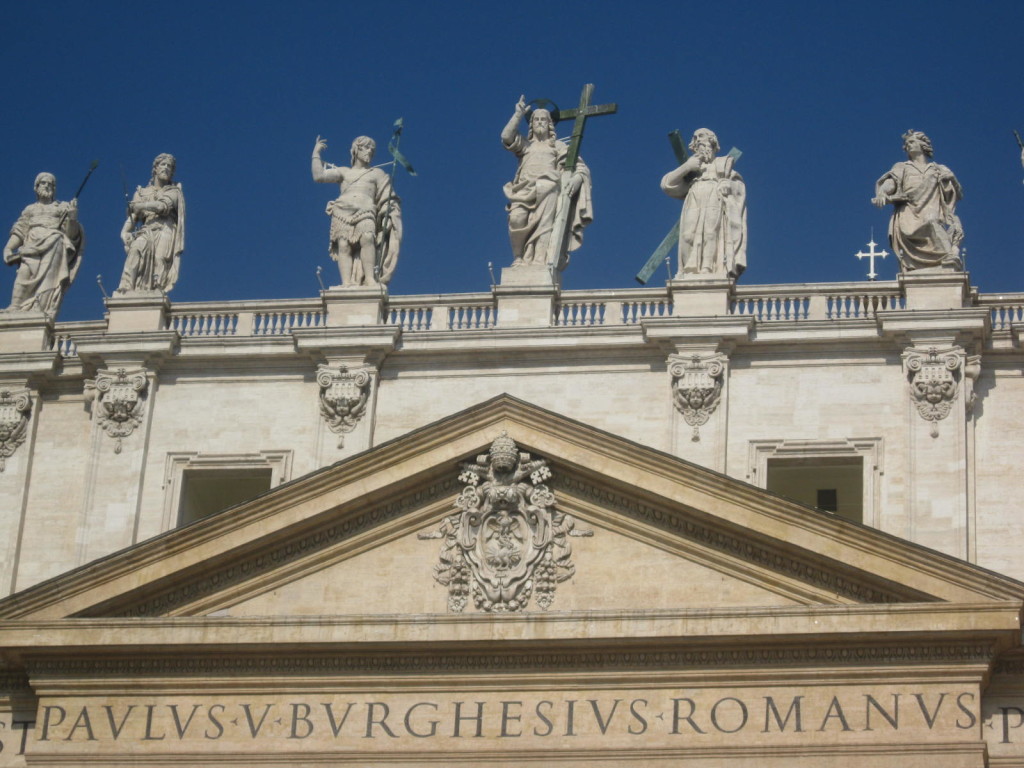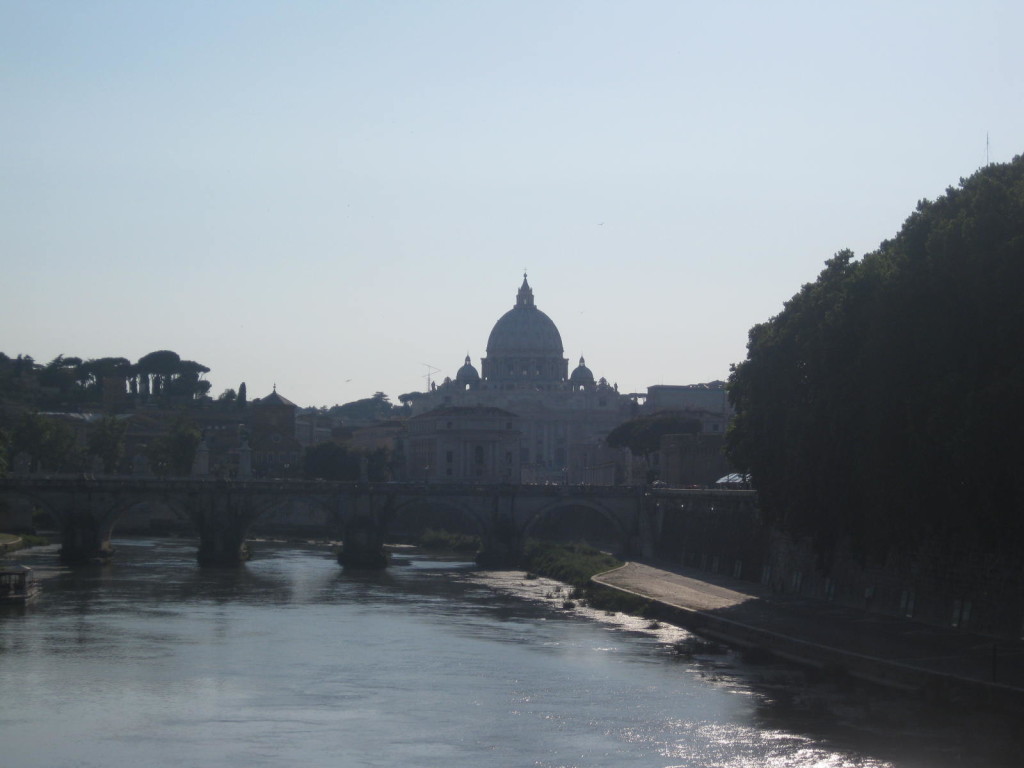
“Spiritual Alzheimer’s disease.” “Existential schizophrenia.” “Terrorism of gossip.” “Pathology of power.” These are the words that so forcefully – and, judged by their reception, perhaps unexpectedly – echoed through the ‘Sala Clementina’ of the Apostolic Palace at the Vatican, during Pope Francis’ annual Christmas address to the Curia – the Vatican’s administrative apparatus.
Described as one of the “harshest criticisms to date of the Curia” and a “blistering attack on the Vatican bureaucracy,” it was an address that has caused quite a stir in the national and international media alike, as a headline from the Religion News Service so astutely captured: “Pope Francis to Curia: Merry Christmas, you power-hungry hypocrites.”
Intended as it was for the Curia’s assembled members, I think there is some underlying wisdom that laymen – or the general public at large – can take away from the Pope’s message, particularly during the start of a new year.
Indeed, in reading the various media coverage and opinions on his address, one could argue that his list of “15 Ailments of the Curia” could serve as the antithesis of a New Years resolution list, regardless of one’s religious affiliation, or lack thereof.
Take, for instance, the first “sickness” declared by Pope Francis:
“…of considering oneself ‘immortal’, ‘immune’ or ‘indispensable’, neglecting the necessary and habitual controls. A Curia that is not self-critical, that does not stay up-to-date, that does not seek to better itself, is an ailing body…it is the sickness of those who transform themselves into masters and believe themselves superior to others…it often comes from the pathology of power…and narcissism.”
Or, his seventh “ailment” – that of:
“rivalry and vainglory: when appearances, the colour of one’s robe, insignia and honours becomes the most important aim in life…it is the disorder that leads us to become false men and women, living a false ‘mysticism’ and a false ‘quietism.”
And his eighth:
“existential schizophrenia: the sickness of those who live a double life, fruit of the hypocrisy typical of the mediocre and the progressive spiritual emptiness that cannot be filled by degrees or academic honours…they create a parallel world of their own, where they set aside everything they teach with severity to others and live a hidden, often dissolute life.”
And ninth:
The sickness of “chatter, grumbling and gossip…it is the disease of cowards, who do not have the courage to speak upfront and so talk behind one’s back…watch out against the terrorism of gossip!”
His 11th:
“The disease of indifference toward others arises when each person thinks only of himself, and loses the sincerity and warmth of personal relationships…when, because of jealousy or cunning, we rejoice in seeing others fail, rather than lift them up and encourage them.”
And his last, the 15th “ailment”:
“the disease of worldly profit and exhibitionism: when the apostle transforms his service into power, and his power into goods to obtain worldly profits or more power. This is the disease of those who seek insatiably to multiply their power and are therefore capably of slandering, defaming and discrediting others, even in newspapers and magazines, naturally in order to brag and to show they are more capable than others.”
Could we not say that these, when flipped around, represent some of the most basic, human ideals that many of us strive for – and which undoubtedly make their way onto many of our New Years Resolution lists each year?
In short, and put simply: to reflect on our actions, show self-restraint and work on humbling and bettering ourselves (#1); to remember that there is more to us, and others, than appearances, awards and accomplishments (#7); to have integrity, be honest and practice what we preach (#8); to not speak falsely, spread rumors, talk behind others back; to mind our own business (#9); to be compassionate, selfless, kindhearted and supportive “(#11); and to avoid becoming greedy, power hungry and arrogant (#15).

While certainly not intended as a New Years Resolution list, in many ways it can be understood and adopted to be just that, not solely for the Curia, but for us – the common folk, the every day man, the famous and the unknown – the population at large.
So, if asked to sum up Pope Francis’ message in a few, short words, I might turn to Henry Burton, a clergyman from the 17th century who once said: “Have you had a kindness shown? Pass it on; ‘twas not given for thee alone, pass it on; let it travel down the years, let it wipe another’s tears, ‘til heaven the deed appears – Pass it on.”
Here’s to wishing you, your families and friends a very Happy New Year! May it bring you peace, joy and happiness unending.
Please note that all information and quotes from Pope Francis’ speech came from the following news sources:
- Wall Street Journal, “Pope Issues Blistering Rebuke of Vatican Bureaucracy”
- CNN, “Pope Francis Attacks ‘Diseases’ of Vatican in Curia Address”
- Vatican Insider, “Pope Francis: The Fifteen ‘Diseases’ of the Curia”
- Vatican Information Service press release
To note: For interesting insights on the Pope’s address, listen to NPR’s broadcast of The Diane Rehm Show here.
Be careful: The Pope does not speak English and the vast Leftist media continually tries to distort his words. Remember, though he is wonderful to tone down his biblical stand against homosexuality & gay marriage, & doing his best to welcome All, he is Not for gay marriage and never will be. As he should.
This was a thought-provoking and well-written post. It gives one much to think about as we start this new year. What are our values and how do we see our ethical obligations to out fellow man?
My congratulations to Pope Francis for his wisdom and courage. And to Katharine for her post.
An interesting observation and comparison to Christian values gone astray.
The pope didn’t say “Do Good works and you’ll be saved.” What he’s talking about is that if one is anipmetttg to live a moral life and care for ones neighbor, that path will eventually lead to God.I think he’s thinking of the Mortimer Adlers of the world….And, of course, the Pope’s idea of a ‘Moral Life” and your garden variety atheist’s idea probably have some …differences.This isn’t really a new idea though. The Church believes that God has places a desire for Him in all human hearts, and that all people have the ability to seek him and find him, because he calls all people to him.So if you’re living a life of morality and service to neighbor, you’ll eventually run across God (because he’s always lurking) and follow him.The problem is that when we live lives devoted to Self and Pleasure, we stop looking outside ourselves for meaning. And then, we can’t find God, because we’ve essentially given up.But the atheist who strives to live a virtuous life and cares for others is a seeking atheist, not a despairing one. He’s on a path that will let him accept Jesus’s gift of faith once he encounters him.Basically, Catholics believe that God ardently desires ALL people to know and love him. We’e not predestined to damnation. We damn ourselves when we all ourselves up in hedonistic self pleasure and ignore the life of love and service that will make us happy. The atheist who tries to do good has not yet damned himself.
When a Coin in the Coffer Rings … A soul from purgatory srginps!” — attributed to Johann Tetzel, a seller of indulgences.So, perhaps this is progress. The Roman Catholic Church has always seemed a bit confused over whether good works alone (without faith) could get one into heaven; Lutherans (“sola fide!”), not so much.The Church is not at all confused. Lots of other people are confused.Tetzel came up with that on his own. Luther was right to be offended. But Tetzel didn’t get Catholic doctrine right. Why is that so surprising?In any case, for all that is bad about that episode–more on that in a moment–the Council of Trent was a wonderful benefit. Read the Decree on the Doctrine of Justification, then let me know if you find it “confusing.” Quick summary: Trent teaches, absolutely, that salvation is by grace.Now, about the tragedy of the Reformation. Fast-forward to circa 1999, when the Catholic Church and the World Lutheran Federation adopted a joint declaration on the doctrine of justification. After walking through all the various issues that have been argued about over the centuries, it came to this startling conclusion:The condemnations that divided the two Churches, over this doctrine, “do not apply.”That’s a boring statement, but here’s what it means:If the convergence of this document had been reached, not in 1999, but in the 1500s, there might not have been a Reformation.So I’d say the Catholic Church is not confused–nor is the Lutheran Church.
Bravo! An important message for all of us to receive! Thank you ATG!
… This subject–who gets saved and how, aidcrocng to Catholic belief–can be maddening to talk about. But hope triumphs over experience! Here goes… Everyone, without exception, who is saved, is saved by the death and resurrection of Jesus Christ. Period. No one is saved by works; it is by God’s grace, first, last and always. Works, however, are understood by Catholic teaching to be themselves a fruit of grace–and therefore, their being involved does not detract from the graciousness of salvation. If non-Catholics, non-Christians, and non-believers get saved (since it isn’t a sure thing for Catholics, it certainly isn’t a sure thing for everyone else), it will be through Christ’s saving work. Period. In heaven, there won’t be an atheists’ heaven, non-Christian heaven, etc. Everyone in heaven will know God as Trinity, Jesus Christ as the Incarnate Son of God. With a bit of imagination, one can describe ways this works out–e.g., how someone who spends his or her life as a non-Christian, or even an atheist, nevertheless finds him or herself adoring the Triune God. C.S. Lewis, to my mind, has done as good a job as anyone. In any case, such speculation remains speculation. The notion that catholic teachings use good works, for the non-believer as an adjunct to soul saving grace is anathema to the scriptures. Matthew 19:24 And again I say unto you, It is easier for a camel to go through the eye of a needle, than for a rich man to enter into the kingdom of God.I don’t require a bit of imagination to understand the necessity of what is required to enter the kingdom of heaven via God’s grace and have my soul saved. It’s pretty clear father and I’m not sure why you or the pope nor the Vatican are defending or clarifying any of this. It’s pretty crystal clear. The proclamation of your intent voiced in body, mind, and soul to allow Jesus Christ to enter your heart as you Lord and Savior through his Blood and Sacrifice and Resurrection is the only way into the Kingdom of God. All three of you are wrong.